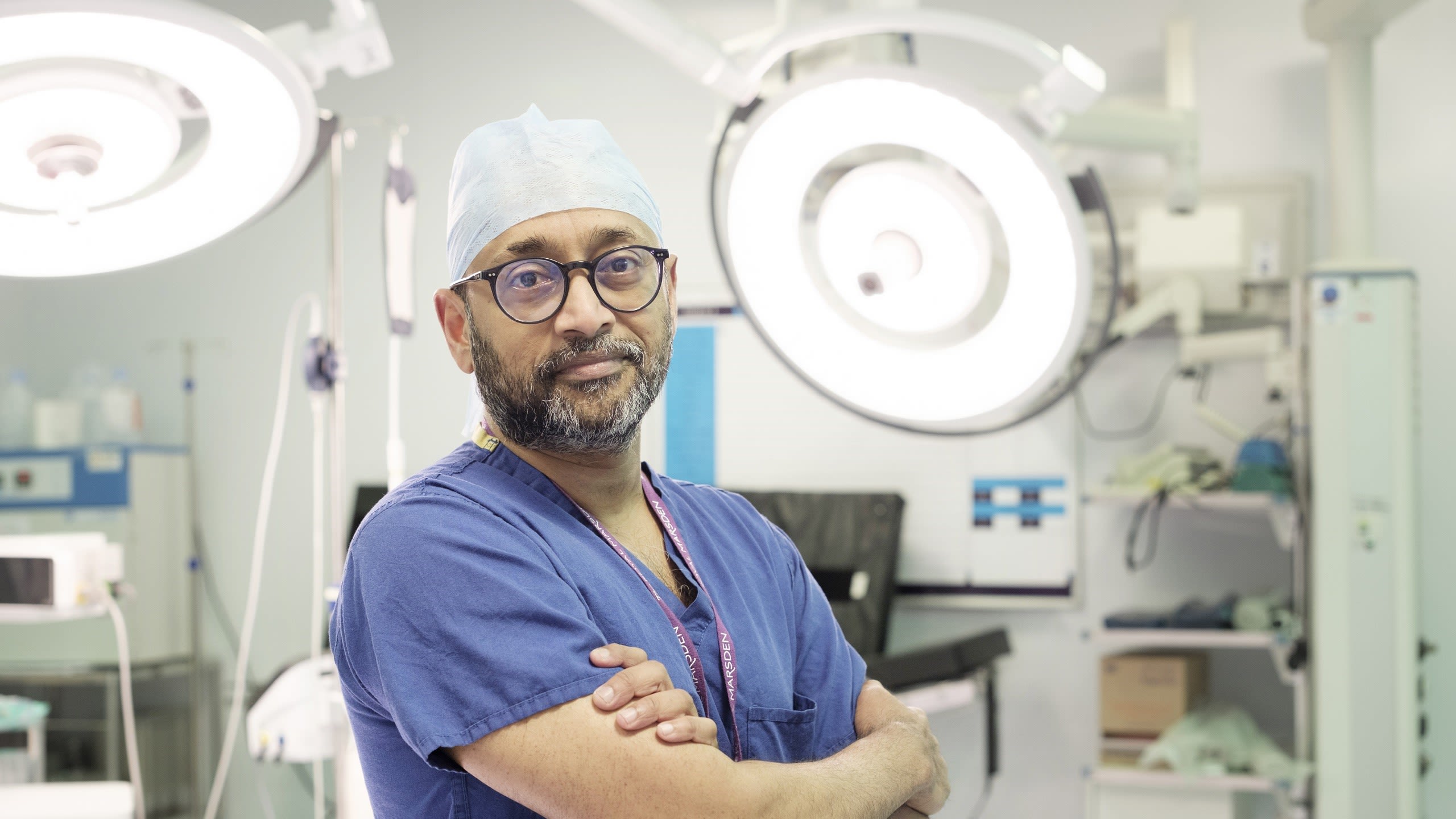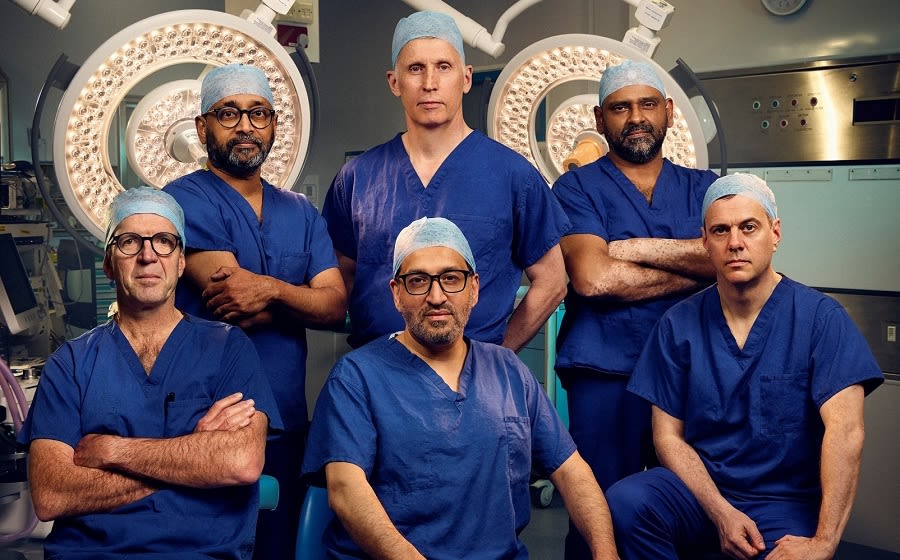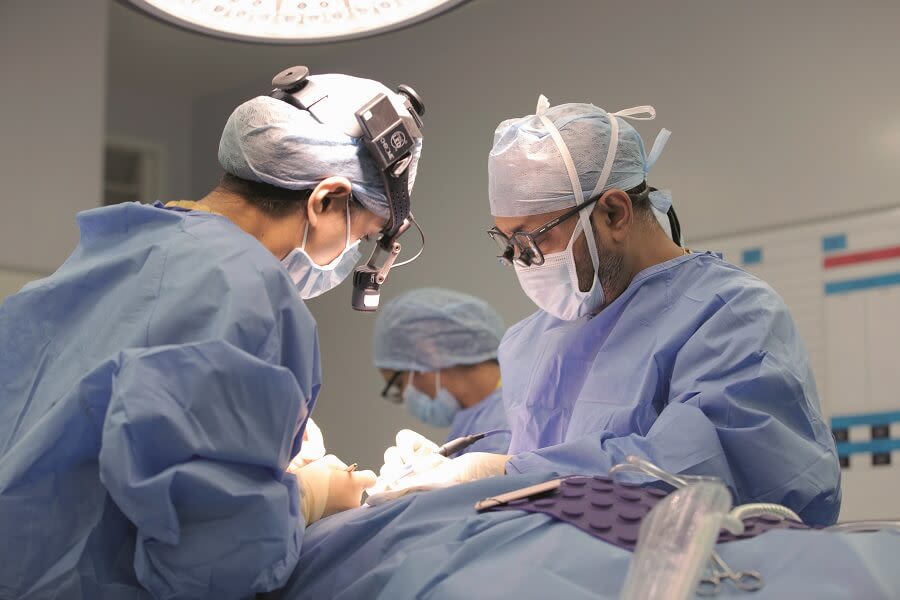Super Surgeons – Q&A with Professor Vin Paleri

Meet The Royal Marsden’s Consultant Head and Neck Surgeon, Professor Vin Paleri, who features in series 1 and 2 of ‘Super Surgeons - A Chance at Life’.
Here, he talks to us about his role, robotic cancer surgery and what it’s like being part of the Channel 4 documentary series.

Professor Paleri is one of the leading head and neck surgeons in the country. He sees patients referred from hospitals across the UK to perform complex surgeries on cancers in the mouth, throat, voice box, the swallowing passage, thyroid gland, salivary gland and the skull base.
As an expert in robotic surgery, Professor Paleri uses state-of-the-art technologies, such as the da Vinci Xi robot, which was funded by The Royal Marsden Cancer Charity. Like many surgeons at The Royal Marsden, he has helped develop new surgical techniques that are now used around the world, and has performed many surgeries that are the first of their kind in the UK. An example is transoral robotic surgery (TORS), which is a minimally invasive surgery that uses a robot to guide tools through the mouth to reach tumours in the head and neck.
Professor Paleri is featuring in the new series of Super Surgeons.
In episode 2 viewers see Professor Paleri and specialists from other NHS Trusts across London come together to conduct a high-stakes surgery on his patient’s neck and carotid artery.

Professor Paleri is featuring in the new series of Super Surgeons.
In episode 2 viewers see Professor Paleri and specialists from other NHS Trusts across London come together to conduct a high-stakes surgery on his patient’s neck and carotid artery.
Q: Why did you want to be part of the series again and what was your favourite part of being involved?
“I got involved in Super Surgeons again, simply because of the complexity of patients who are referred to us for our expertise in cancer care. The Royal Marsden specialises in the management of recurrent and complex cancers. We’re able to come up with new treatment plans and think outside of the box so we can help to improve these patients’ lives."
"I wanted to give people watching the documentary hope that if cancer comes back, it is not time to give up – there are treatments available.”
“As surgeons, we are a part of a multidisciplinary team. Our colleagues include nurses, speech and language therapists, dietitians, junior doctors and anaesthetists, among countless other professionals who all play an invaluable role in patient care. The opportunity to depict and emphasise the multidisciplinary working in the documentary has by far been my favourite part of the process."

Q: How did you find filming the documentary?
“The filming was a fascinating experience, and, on a personal level, I enjoyed it far more than I expected to. I liked the way the film crew followed the patients on every aspect of their journey at The Royal Marsden.”
“The biggest stars were all the patients who allowed themselves to be filmed – an incredible act of bravery and kindness."
"I am always humbled by the tribulations patients and their loved ones experience during their cancer journey outside of the hospital. The impact on family, work, social life and finance can be profound and the series demonstrates this eloquently. This is a unique group of patients for whom the cancers come back after treatment, and for whom no other options are available. And in that group of patients, the research, supported by The Royal Marsden Cancer Charity, has been instrumental in coming up with new treatment options.”
Q: How has The Royal Marsden Cancer Charity supported your work in robotic surgery?
“We wouldn’t be able to do what we do without the funding from The Royal Marsden Cancer Charity and its fantastic supporters. The money raised goes on to deliver life-changing cancer treatments, which translates into massive benefit for the entire population of the UK and around the world.”
“The Charity has funded two da Vinci Xi robots, one through a generous gift from the late philanthropist Don McCarthy and his children. This support has enabled The Royal Marsden to become the most comprehensive centre for robotic cancer surgery in the UK, ensuring patients with urological, gynaecological, head and neck, gastrointestinal and colorectal cancers have access to the latest techniques and technology.”
“And my specialty of head and neck cancer has been a direct beneficiary of further funding from The Royal Marsden Cancer Charity, which has enabled us to open the world’s first International Centre for Recurrent Head & Neck Cancer (IReC). The centre was made possible thanks to Charles Wilson CBE and Dr Rowena Olegario, and Keith and Isabelle McDermott’s generous support of The Royal Marsden Cancer Charity. We have created a centre of international excellence and set the international standards in the curative treatment of recurrent head and neck cancers.”

Image © Wonderhood Studios
Image © Wonderhood Studios
“The more we understand about the biology of cancer, the better chance we have of defeating it. If we know what makes each cancer tick, we may be able to find the right way to stop it ticking. Through IReC, we’re driving research into how minimally invasive robotic surgeries can improve patients’ ability to swallow and their function to speak following surgery, and how the molecular profiles of tumours can be used to better personalise treatments.”

Q: How has the da Vinci Xi robot changed cancer surgery?
“The level of surgical care we can provide cancer patients has changed significantly in the last decade. Thanks to advances in robotic technology, we use much more minimally invasive techniques to remove some head and neck cancers. The da Vinci robots provide a magnified, high definition, 3D view inside the patient and allow surgeons to make microscopic incisions with greater accuracy and control than ever before. The accuracy of the robots means surgeons can also operate on tumours that would have been hard to reach or were previously inoperable.”
“I can now do surgeries through natural orifices, like a patient’s mouth, where I previously would have had to split open a jaw. This means patients may now have less pain, a much quicker recovery and fewer long-term side effects. So being able to offer these surgeries has meant an incredible difference to the patient’s quality of life after surgery.”

"Robotic surgery is undertaken by surgeons using a console to control the arms of the robot. The da Vinci Xi has dual consoles, allowing The Royal Marsden to run the Charity-funded Robotic Surgery Fellowship programme, which is training the surgeons of the future.”

“Surgeons performing robotically assisted surgery require specialised training. But thanks to the dual console of the da Vinci Xi – which allows consultants to supervise trainees during live surgery, at no risk to the patient – The Royal Marsden is training future robotic surgeons through the UK’s first cross-speciality Robotic Surgery Fellowship programme. This training programme has been funded by supporters of The Royal Marsden Cancer Charity.”
Q: How has the da Vinci Xi robot changed cancer surgery?
“The level of surgical care we can provide cancer patients has changed significantly in the last decade. Thanks to advances in robotic technology, we use much more minimally invasive techniques to remove some head and neck cancers. The da Vinci robots provide a magnified, high definition, 3D view inside the patient and allow surgeons to make microscopic incisions with greater accuracy and control than ever before. The accuracy of the robots means surgeons can also operate on tumours that would have been hard to reach or were previously inoperable.”

“I can now do surgeries through natural orifices, like a patient’s mouth, where I previously would have had to split open a jaw. This means patients may now have less pain, a much quicker recovery and fewer long-term side effects. So being able to offer these surgeries has meant an incredible difference to the patient’s quality of life after surgery.”
“Robotic surgery is undertaken by surgeons using a console to control the arms of the robot. The da Vinci Xi has dual consoles, allowing The Royal Marsden to run the Charity-funded Robotic Surgery Fellowship programme, which is training the surgeons of the future.”

“Surgeons performing robotically assisted surgery require specialised training. But thanks to the dual console of the da Vinci Xi – which allows consultants to supervise trainees during live surgery, at no risk to the patient – The Royal Marsden is training future robotic surgeons through the UK’s first cross-speciality Robotic Surgery Fellowship programme. This training programme has been funded by supporters of The Royal Marsden Cancer Charity.”
Your support helps the teams at The Royal Marsden go even further for people with cancer.


Be the first to hear the latest news and inspiring stories.
Sign up to our emails and we’ll keep you updated about how The Royal Marsden Cancer Charity is helping cancer patients across the UK and beyond, and ways you can get involved.
